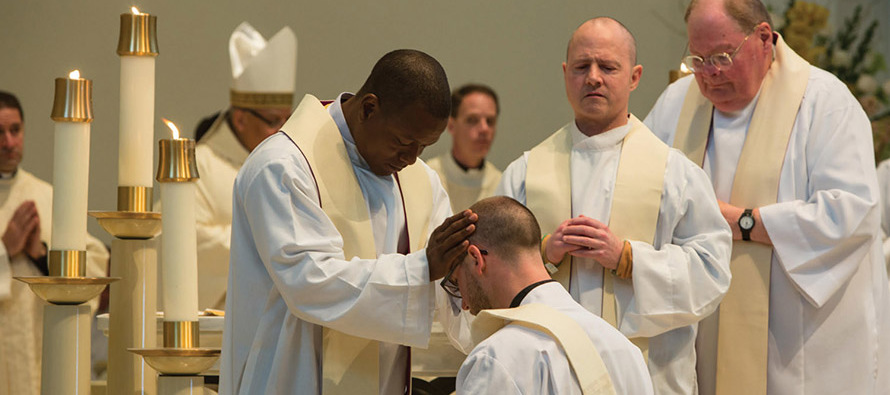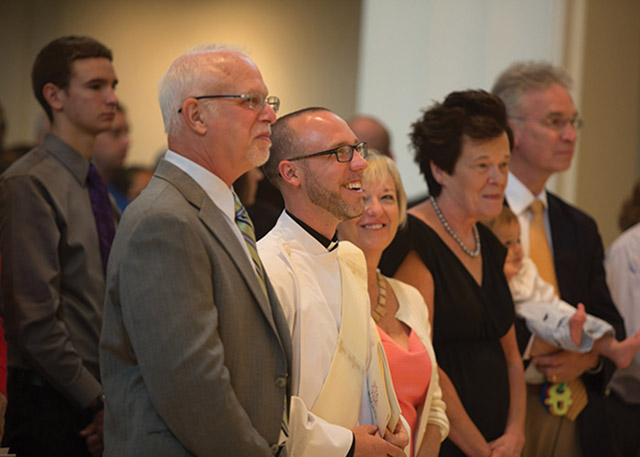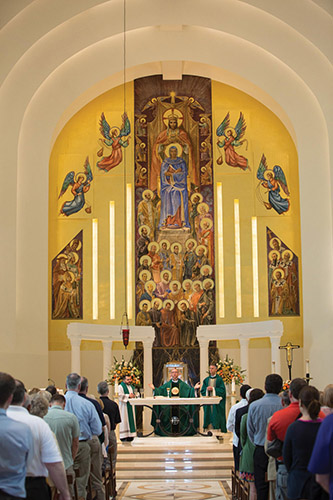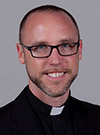God rushes in

Father Paddy Gilger, S.J. receives blessings from fellow Jesuits during his ordination Mass. (Photos courtesy of Father Paddy Gilger, S.J.)
I had sung scores of Lakota prayer songs in sweat lodges across the Pine Ridge reservation and talked about Jesus in halls packed with people. I had walked down dusty roads at sunset behind schoolchildren and nuns holding black plastic rosaries and said hundreds of Hail Marys. I had listened for hours as faith was shared, sat in dozens of desks in graduate classrooms, read thousands of pages about God. But I had never before performed the Last Rites—which accounted for my nerves as I stood before the door of a dying woman’s home and raised my hand to knock.
When I did, the door opened quickly and her daughter’s welcome was smooth and warm. I sat in my clerical suit at the kitchen table—my green Pastoral Care of the Sick book set next to the holy oils and my white stole before me—while she gathered her mother from the bedroom, settled her in the recliner, arranged her veined hands on her lap. “She’d like to talk to you alone,” she said and left the room.
I used the few moments necessary to move a chair across the room to gather myself. “I’m glad you’re here,” she said, moving her head to look at me as I put on the stole. Her voice was thin and clear, more air than words, but she wanted something and knew what it was. “Me too,” I replied. She looked down and regathered her breath. I spoke again when she looked up: “Is there anything you want to say to God?” I asked. She nodded. Her chest rose and fell. We waited and I held onto her hand.

“I want to say . . . ,” her voice caught. She looked at me and began again, “I want to say . . . that I’ve tried my hardest . . . to be a good person . . . And that I’m sorry for everything I’ve done wrong.” I nodded. “And that I’m ready.”
“You’re ready?” I asked her.
“Yes,” she replied, “I’m ready.”
“Is God ready for you?” I asked her. “Yes,” she replied, “He’s right here. Ready for me.” The tears were coming but not yet. “Is anybody there with Him? Anybody else there to welcome you?” She looked away, nodded, and said, “My husband. He’s there ready for me.” It felt still all around us. She breathed, held my hand. And after a few breaths I asked, “How does it feel that God and your husband are ready for you?”
“It feels great,” she said and smiled. “It feels great.”
Serving as a means for God
The first years of priesthood have felt great, too. As great as the desire that people, normal people, have to feel close to God. As great as the tension their desire puts on my stretched heart and my challenged mind. As great as the privilege it has been to be with people in such vulnerable moments—moments when their hearts are suddenly wide open and the God who has always longed for such an opening rushes in.
It’s easily the best thing about being a priest, that feeling of dual fulfillment when the long-awaited God at last arrives. There is no way for a human being—for me, I mean—to be worthy of being on the scene when God and a human person encounter one another, but it happens all the time. And that I am around to help it happen and grease the wheels of the rusty heart? That’s the best thing, too.

The Catechism of the Catholic Church, at number 1547, is clear that to be a priest is to be a “means” and nothing more. It says: “While the common priesthood of the faithful is exercised by the unfolding of baptismal grace—a life of faith, hope, and charity, a life according to the Spirit—the ministerial priesthood is at the service of the common priesthood. It is directed at the unfolding of the baptismal grace of all Christians. The ministerial priesthood is a means by which Christ unceasingly builds up and leads his Church.” The great privilege of priesthood is to become from the roots of one’s being a means for God to get what God wants: Closer proximity to God’s chosen people.
Not that God couldn’t have rushed in to be with this dying woman if I were not there. Not that she would have turned the Lord away if there were no priest present. That is not the point. The point, as evidenced in my own life at least, is that human beings often need help to do even things of which we are capable on our own. I certainly do.
I need to lean on my brother Jesuits. I need the people of God, my brothers and sisters in Christ, to keep me accountable. I need my spiritual director to point out to me, for the thousandth time, that I have succumbed to that same old sin in yet another way. Which is all just another way to say the same thing we’ve all been saying since Saint Augustine and before: We need you, God.
It’s this that has been my experience as a priest: That people need help admitting, accepting, saying out loud, “I need you, God.” That’s why I think people need priests: because people are human, which is just a shorter way of saying:
• I need help breaking down that same brick wall that surrounds the soul—again.
• I need help admitting I’m a sinner.
• I need help to promise to love this person forever.
• I need help dying.
• I need help becoming me.
A version of this article originally appeared in VISION 2015.
Related article: VocationNetwork.org, “Change today? One man's journey into priesthood.”
Tags
Related
- Taking a chance on God: Profile of Father David Gutierrez, C.M.F.
- About-face to the priesthood
- Moved by the power of the Eucharist: Profile of Father Duy Henry Bui Nguyen, S.C.J.
- No regrets: A grateful priest takes stock
- We’re different—in a good way: Profile of Father Roberto Mejia, O.Carm.
- Man with a mission
- Monastic life is habit-forming
- Ministering to migrants in a carport cathedral
- Connections make the man: Profile of Father Kevin Zubel, C.Ss.R.
- A priest (who’s been there) responds to the pain of addiction Read More
Most Viewed
- Find your spirituality type quiz
- Questions and answers about religious vocations
- Celibacy quiz: Could I be a nun? Could I be a brother? Could I be a priest?
- Resources for older discerners or those with physical and developmental differences
- About Vocation Network and VISION Guide


